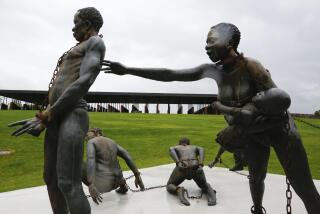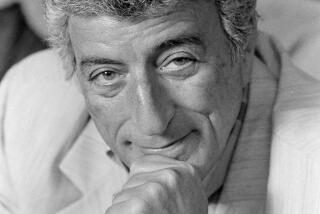Winifred Bennett, 71; her suggestion led to DNA test of Jefferson
The debate over whether Thomas Jefferson fathered the children of his slave Sally Hemings had persisted for more than 150 years when Winifred Bennett set out to end it.
In 1996, while having dinner at the home of her friend Dr. Eugene Foster, Bennett proposed applying DNA testing to the Jefferson-Hemings question. She would finance the study, then reveal the findings in a book about the long-running dispute and its meaning.
“It’s obviously of interest to a lot of people,” Bennett said in a 1997 interview with the Associated Press. “Here might be a way to finish the talk about it.”
Bennett, whose suggestion resulted in a scientific study that found a genealogical link between America’s third president and Hemings’ descendants, died Oct. 7 of kidney failure at her home in Arlington, Va., said her daughter, Phoebe Bennett. She was 71.
For most of the nation, including historians, the study settled the controversy and opened another discussion -- just as Bennett had hoped.
“People have moved on to talk about ‘What does it say about gender; what does it say about the nature of slavery?’ ” said Annette Gordon-Reed, a presidential scholar and professor at New York Law School. “We’re beyond ‘Did he or didn’t he?’ We’re at ‘What does it all mean and how is this incorporated into [Jefferson’s] biography?’ ”
Bennett, the daughter of William Joyce, a vice president of Rockwell International, and Louise Beeler, a homemaker, was born in Columbus, Ohio, and grew up in Hamilton, north of Cincinnati.
After graduating from Cornell University with a degree in philosophy, she worked in New York as a model and then in Dayton, Ohio, as a computer programmer for Mead Corp. She married Hunter M. Bennett Jr. in 1963, and the couple lived in Clarksburg, W.Va. She is survived by her daughter and son, John, of New York City.
In 1993, after she and her husband divorced, Bennett moved to Charlottesville, Va., and enrolled in art classes at the University of Virginia, which Jefferson had established. While there, she encountered dueling biographies, one by Jefferson’s white descendants and one by African Americans who also claimed to be his descendants.
As far back as the 1800s, African Americans -- including Hemings’ son Madison and others who lived at Monticello, the Jefferson family home -- had identified the former president as the father of some of Hemings’ children.
But most historians dismissed those contentions and relied on letters written by Jefferson’s grandchildren that claimed Hemings’ children were fathered by two of Jefferson’s nephews.
“There were all these camps in Charlottesville of Jefferson descendants,” said Bennett’s daughter. “She thought it would be fascinating to interview them all and see what their stake in all this was and how knowing” whether Jefferson had fathered a child by Hemings would affect them.
Bennett’s idea of using DNA was prompted by its application in another matter of historical significance. A woman in Charlottesville had claimed to be Anastasia, daughter of the last Russian czar. DNA tests proved that she was not and instead came from a Polish family.
“It just struck me that if they can do DNA on Anastasia Romanov, then they could do DNA on Jefferson,” Bennett said in a 1998 interview with the Washington Post.
Foster was not so certain. After Bennett raised the question during that 1996 dinner, the retired pathologist began studying the matter.
“I reached the conclusion that theoretically it may be almost impossible using the conventional technology that was being used for tracing ancestry,” he said.
But Bennett persisted. When Gordon-Reed, author of “Thomas Jefferson and Sally Hemings: An American Controversy,” appeared at a book festival in Charlottesville, Bennett announced that she and Foster had embarked on a study that would settle the controversy. The announcement made the newspapers.
“All the experts said it was a crazy idea, and I was somewhat embarrassed,” Foster said.
But the announcement brought a response from a professor who was aware of a form of DNA testing using the Y chromosome, which is passed down from fathers to sons only. By studying the DNA of male descendants in question, researchers could offer scientific evidence of paternity.
Foster contacted a leading researcher in this form of DNA testing at Oxford University in England, who agreed to do the work and brought in other researchers. For a brief time, Bennett and Foster worked together, searching for descendants and traveling to collect blood samples and conduct interviews.
“She was amazed by the spectrum she found,” Phoebe Bennett said. “It was totally all over the map. There were a lot of African American descendants whose personal pride was in thinking of themselves as being a descendant of a president, and there were others who couldn’t care less one way or the other.”
Some white descendants couldn’t fathom the idea of Jefferson having children with Hemings. Others did not care about their presidential heritage or the debate, Phoebe Bennett said.
In 1997, Bennett and Foster’s friendship ended. Bennett wanted to publish the findings first in her book, but Foster sought a different approach.
“It became clear to me once all the scientists were involved in this that the study, whatever the results might be, it would only have real credibility if published ... in a reputable journal,” he said.
Foster and other scientists published the findings in 1998 in the journal Nature. The scientific evidence, combined with the historical evidence, “led people to the conclusion that what the enslaved people at Monticello had been saying was true,” Gordon-Reed said.
“The testimony of enslaved people is given short shrift,” she said. “Here was the first time you had science to come in and support what they had been saying.”
The study was covered by national and international media and added a new element to an old story.
Although Bennett never wrote her book, “she took a lot of pride in the fact that it was her idea and that people thought it was a good idea,” Phoebe Bennett said.
*
More to Read
Sign up for Essential California
The most important California stories and recommendations in your inbox every morning.
You may occasionally receive promotional content from the Los Angeles Times.










